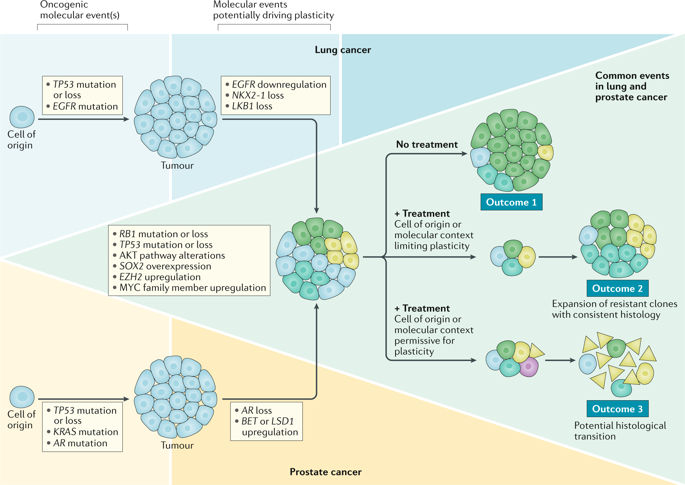当前位置:
X-MOL 学术
›
Nat. Rev. Clin. Oncol.
›
论文详情
Our official English website, www.x-mol.net, welcomes your
feedback! (Note: you will need to create a separate account there.)
Lineage plasticity in cancer: a shared pathway of therapeutic resistance.
Nature Reviews Clinical Oncology ( IF 81.1 ) Pub Date : 2020-03-09 , DOI: 10.1038/s41571-020-0340-z Álvaro Quintanal-Villalonga 1 , Joseph M Chan 1, 2, 3 , Helena A Yu 1 , Dana Pe'er 2, 3 , Charles L Sawyers 4, 5 , Triparna Sen 1 , Charles M Rudin 1
Nature Reviews Clinical Oncology ( IF 81.1 ) Pub Date : 2020-03-09 , DOI: 10.1038/s41571-020-0340-z Álvaro Quintanal-Villalonga 1 , Joseph M Chan 1, 2, 3 , Helena A Yu 1 , Dana Pe'er 2, 3 , Charles L Sawyers 4, 5 , Triparna Sen 1 , Charles M Rudin 1
Affiliation

|
Lineage plasticity, the ability of cells to transition from one committed developmental pathway to another, has been proposed as a source of intratumoural heterogeneity and of tumour adaptation to an adverse tumour microenvironment including exposure to targeted anticancer treatments. Tumour cell conversion into a different histological subtype has been associated with a loss of dependency on the original oncogenic driver, leading to therapeutic resistance. A well-known pathway of lineage plasticity in cancer - the histological transformation of adenocarcinomas to aggressive neuroendocrine derivatives - was initially described in lung cancers harbouring an EGFR mutation, and was subsequently reported in multiple other adenocarcinomas, including prostate cancer in the presence of antiandrogens. Squamous transformation is a subsequently identified and less well-characterized pathway of adenocarcinoma escape from suppressive anticancer therapy. The increased practice of tumour re-biopsy upon disease progression has increased the recognition of these mechanisms of resistance and has improved our understanding of the underlying biology. In this Review, we provide an overview of the impact of lineage plasticity on cancer progression and therapy resistance, with a focus on neuroendocrine transformation in lung and prostate tumours. We discuss the current understanding of the molecular drivers of this phenomenon, emerging management strategies and open questions in the field.
中文翻译:

癌症中的谱系可塑性:治疗耐药性的共享途径。
谱系可塑性,即细胞从一种定向发育途径过渡到另一种发育途径的能力,已被提议作为肿瘤内异质性和肿瘤适应不利肿瘤微环境(包括暴露于靶向抗癌治疗)的来源。肿瘤细胞转化为不同的组织学亚型与失去对原始致癌驱动因素的依赖有关,从而导致治疗耐药。癌症中一种众所周知的谱系可塑性途径——腺癌向侵袭性神经内分泌衍生物的组织学转化——最初在携带 EGFR 突变的肺癌中被描述,随后在多种其他腺癌中被报道,包括存在抗雄激素的前列腺癌。鳞状转化是腺癌逃避抑制性抗癌治疗的一种随后确定的和不太明确的途径。随着疾病进展,肿瘤再活检的实践增加,增加了对这些耐药机制的认识,并提高了我们对潜在生物学的理解。在这篇综述中,我们概述了谱系可塑性对癌症进展和治疗抵抗的影响,重点是肺和前列腺肿瘤中的神经内分泌转化。我们讨论了目前对这一现象的分子驱动因素的理解、新兴的管理策略和该领域的开放性问题。随着疾病进展,肿瘤再活检的实践增加,增加了对这些耐药机制的认识,并提高了我们对潜在生物学的理解。在这篇综述中,我们概述了谱系可塑性对癌症进展和治疗抵抗的影响,重点是肺和前列腺肿瘤中的神经内分泌转化。我们讨论了目前对这一现象的分子驱动因素的理解、新兴的管理策略和该领域的开放性问题。随着疾病进展,肿瘤再活检的实践增加,增加了对这些耐药机制的认识,并提高了我们对潜在生物学的理解。在这篇综述中,我们概述了谱系可塑性对癌症进展和治疗抵抗的影响,重点是肺和前列腺肿瘤中的神经内分泌转化。我们讨论了目前对这一现象的分子驱动因素的理解、新兴的管理策略和该领域的开放性问题。
更新日期:2020-03-09
中文翻译:

癌症中的谱系可塑性:治疗耐药性的共享途径。
谱系可塑性,即细胞从一种定向发育途径过渡到另一种发育途径的能力,已被提议作为肿瘤内异质性和肿瘤适应不利肿瘤微环境(包括暴露于靶向抗癌治疗)的来源。肿瘤细胞转化为不同的组织学亚型与失去对原始致癌驱动因素的依赖有关,从而导致治疗耐药。癌症中一种众所周知的谱系可塑性途径——腺癌向侵袭性神经内分泌衍生物的组织学转化——最初在携带 EGFR 突变的肺癌中被描述,随后在多种其他腺癌中被报道,包括存在抗雄激素的前列腺癌。鳞状转化是腺癌逃避抑制性抗癌治疗的一种随后确定的和不太明确的途径。随着疾病进展,肿瘤再活检的实践增加,增加了对这些耐药机制的认识,并提高了我们对潜在生物学的理解。在这篇综述中,我们概述了谱系可塑性对癌症进展和治疗抵抗的影响,重点是肺和前列腺肿瘤中的神经内分泌转化。我们讨论了目前对这一现象的分子驱动因素的理解、新兴的管理策略和该领域的开放性问题。随着疾病进展,肿瘤再活检的实践增加,增加了对这些耐药机制的认识,并提高了我们对潜在生物学的理解。在这篇综述中,我们概述了谱系可塑性对癌症进展和治疗抵抗的影响,重点是肺和前列腺肿瘤中的神经内分泌转化。我们讨论了目前对这一现象的分子驱动因素的理解、新兴的管理策略和该领域的开放性问题。随着疾病进展,肿瘤再活检的实践增加,增加了对这些耐药机制的认识,并提高了我们对潜在生物学的理解。在这篇综述中,我们概述了谱系可塑性对癌症进展和治疗抵抗的影响,重点是肺和前列腺肿瘤中的神经内分泌转化。我们讨论了目前对这一现象的分子驱动因素的理解、新兴的管理策略和该领域的开放性问题。









































 京公网安备 11010802027423号
京公网安备 11010802027423号